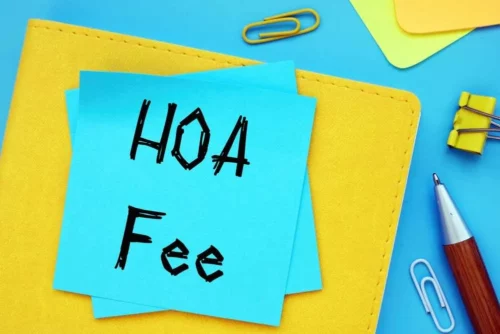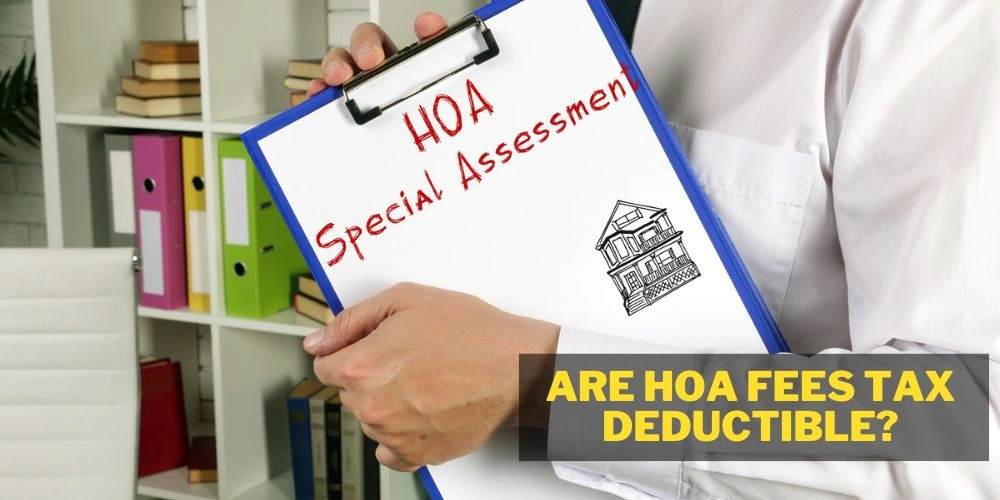Homeowners associations (HOAs) are common in many residential communities. They collect fees from homeowners to cover shared expenses like property maintenance, landscaping, and amenities.
As a homeowner, you might wonder whether these HOA fees are tax-deductible. The answer depends on various factors, including the use of your property and how you manage it. Let’s learn are HOA fees tax deductible?
This article explores when HOA fees are tax-deductible, the rules governing these deductions, and how you can claim them if you’re eligible.
What Are HOA Fees?
HOA fees are payments made to a homeowners association that help maintain and improve shared community areas. These fees typically cover expenses like landscaping, trash removal, security, property repairs, and upkeep of amenities like pools or gyms.
They are usually billed monthly or annually and are required from all property owners within a community that is part of an HOA.
HOA fees are essential for maintaining the overall quality of life in the community. They ensure that shared spaces are properly managed and that residents benefit from well-kept common areas.
However, despite the many benefits, homeowners often wonder if these fees can be deducted from their taxes.
Are HOA Fees Tax Deductible?
In general, HOA fees are not tax-deductible for a primary residence. The IRS views HOA fees as a personal living expense. Since they are paid to maintain a private home or community, they do not qualify as a deductible expense for tax purposes.
However, there are some exceptions. If you are using your property for business purposes, such as renting it out or using part of your home for a home office, certain HOA fees may be deductible.
In these cases, the IRS treats the fees as part of your business expenses. Understanding when HOA fees can be deducted requires knowing how the property is used.
When Are HOA Fees Tax Deductible?
HOA fees can be tax-deductible under specific conditions. These conditions typically apply to rental properties, investment properties, and home offices. Let’s break down these situations where you may qualify for a deduction.

1. Rental Properties
If you own a rental property, the HOA fees that you pay for maintaining the common areas of the property can be deductible. This is because the IRS considers rental properties to be income-generating assets. Any expenses that help maintain the property and contribute to its rental income are generally deductible.
For instance, if you own a condo and pay HOA fees for services like trash removal, landscaping, and repairs in shared spaces, these costs are deductible.
You must report the HOA fees as part of the expenses associated with your rental property on your tax return.
The deductible amount will depend on how much you spend on HOA fees for the rental property and the type of property you own.
2. Home Office Deductions
If you use part of your home exclusively for business purposes, you may be able to deduct a portion of your HOA fees as part of your home office deduction. The IRS allows homeowners to claim a deduction for expenses related to maintaining the portion of their home used for business.
To qualify for the home office deduction, the space must be used exclusively and regularly for business activities.
For example, if you use 10% of your home as a home office, you can deduct 10% of your HOA fees as part of your home office expenses.
This deduction can apply to both direct costs (like office supplies) and a proportionate share of indirect costs, such as utilities, mortgage interest, and HOA fees.
3. Investment Properties
If you own an investment property, similar to rental properties, you can generally deduct HOA fees associated with maintaining the property.
An investment property is an asset you own to generate income or appreciation. If the property is held for business purposes and not for personal use, the HOA fees can be deducted as part of your business expenses.
Like rental properties, these fees must be reasonable and directly related to the upkeep of the investment property.
Proper documentation is key when claiming these deductions, so keeping records of all HOA-related expenses is essential.
How to Deduct HOA Fees for Rental or Investment Properties
When you deduct HOA fees for rental or investment properties, the process typically involves reporting the fees on your tax return. For rental properties, the HOA fees are generally included on Schedule E (Supplemental Income and Loss), which is used for reporting rental income and expenses.

On this form, you’ll list your rental income and the expenses associated with maintaining the property. HOA fees should be reported under the section for property expenses.
Remember that only the portion of the fees related to the rental property is deductible. If you have a mixed-use property where part of it is for personal use and part for rental, you’ll need to allocate the fees accordingly.
For investment properties that are not rented out but held for resale or appreciation, the HOA fees may also be considered a business expense. This can be claimed as part of your operating costs for managing the property.
Example: If you own a condominium and pay $2,000 in HOA fees annually, and 50% of the property is rented out, you can deduct $1,000 of the HOA fees as part of your rental property expenses.
Home Office Deductions and HOA Fees
Home office deductions allow homeowners who use part of their residence for business to deduct a portion of their living expenses, including HOA fees.
To calculate this deduction, you’ll need to determine the percentage of your home that is used exclusively for business. This percentage is then applied to your HOA fees and other expenses related to the home.
For example, if your home office occupies 10% of your home’s total square footage, you can deduct 10% of the HOA fees as part of your home office expenses.
If your annual HOA fees total $2,000, you could potentially deduct $200 of that amount as a business expense.
Keep in mind that the home office deduction has specific rules, and the space must be used exclusively for business. This means it cannot serve any personal purpose, such as a guest room or family room.
Other HOA-Related Expenses That Could Be Deductible
While HOA fees are the most common expense homeowners may want to deduct, other HOA-related costs might also be deductible under certain circumstances.
For example, if the HOA imposes special assessments to cover a significant repair or improvement, these costs may also be deductible for rental or investment properties.
However, the special assessment would not be deductible if the property is used for personal purposes.
How to Report HOA Fees on Your Taxes
To report HOA fees on your taxes, you’ll need to file the appropriate forms. For rental properties, you’ll generally use Schedule E, which is attached to your Form 1040. This form allows you to report rental income and deduct expenses, including HOA fees.
If you are claiming a home office deduction, you will file Form 8829, which is used to calculate and report the home office deduction.
On this form, you’ll enter the total expenses for your home, including a portion of your HOA fees that are used for the business portion of your home.
Common Mistakes to Avoid When Deducting HOA Fees
One common mistake is treating HOA fees as deductible for a personal residence. If the property is not used for rental or business purposes, HOA fees are generally not deductible.
Another mistake is failing to properly allocate HOA fees for mixed-use properties. If part of your home is used for business purposes, you can only deduct the portion of the HOA fees that relates to the business use.
Another potential mistake is not keeping proper records. Without receipts or documentation of the HOA fees, it can be difficult to substantiate a claim for a deduction. Make sure to keep accurate records of all payments and expenses related to HOA fees.
Conclusion
HOA fees can be a significant cost for homeowners, but they are generally not deductible for personal residences.
However, if you use your property for business purposes—whether as a rental property or by claiming a home office deduction—HOA fees may be deductible.
Keeping accurate records and understanding how to allocate and report these fees is essential for maximizing your tax benefits.
If you’re unsure about whether your HOA fees are deductible or how to claim them, it’s a good idea to consult with a tax professional. They can help ensure that you comply with IRS regulations and take advantage of any deductions you are eligible for.


 Tags:
Tags:










